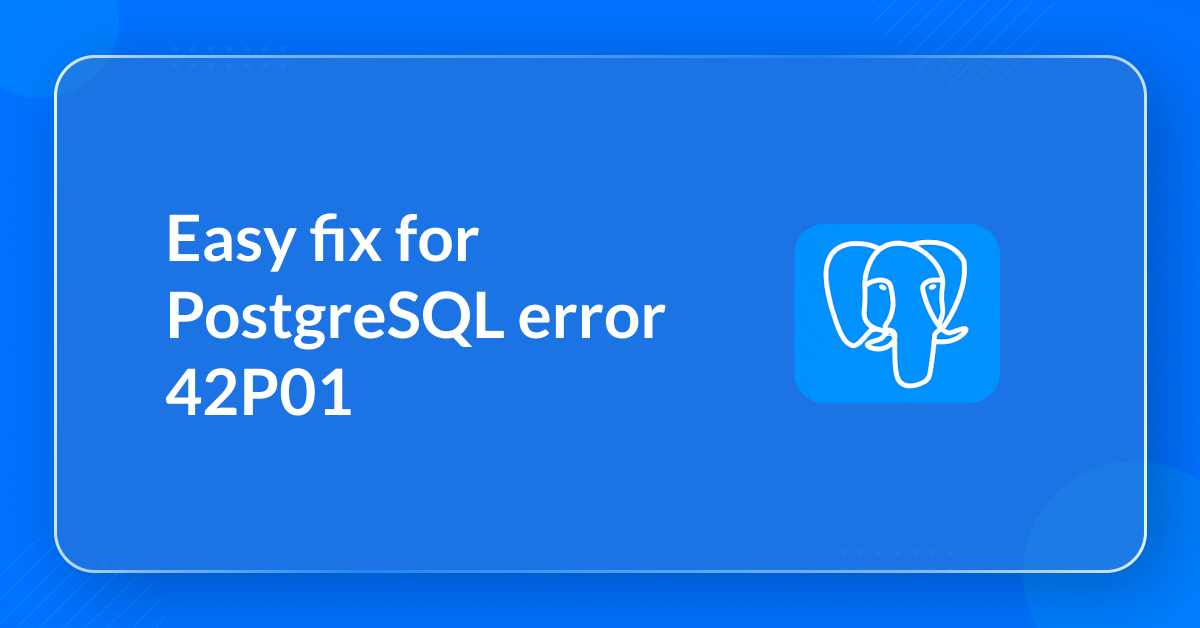PostgreSQL error 42P01 actually makes users dumbfounded, especially the newbies.
Usually, this error occurs due to an undefined table in newly created databases.
That’s why at Bobcares, we often get requests to fix PostgreSQL errors, as a part of our Server Management Services.
Today, let’s have a look into the PostgreSQL error 42P01 and see how our Support Engineers fix it.
What is PostgreSQL error 42P01?
PostgreSQL has a well-defined error code description. This helps in identifying the reason for the error.
Today, let’s discuss in detail about PostgreSQL error 42P01. The typical error code in PostgreSQL appears as:
ERROR: relation "[Table name]" does not exist SQL state:42P01
Here the 42P01 denotes an undefined table.
So, the code description clearly specifies the basic reason for the error.
But what does an undefined table means?
Let’s discuss it in detail.
Causes and fixes for the PostgreSQL error 42P01
Customer query on undefined tables of a database often shows up the 42P01 error.
Now let’s see a few situations when our customers get the 42P01 error. We will also see how our Support Engineers fix this error.
1. Improper database setup
Newbies to Postgres often make mistakes while creating a new database. Mostly, this improper setup ends up in a 42P01 error.
In such situations, our Support Team guides them for easy database setup.
Firstly, we create a new database. Next, we create a new schema and role. We give proper privileges to tables.
Postgres also allows users to
ALTER DEFAULT PRIVILEGES.
2. Unquoted identifiers
Some customers create tables with mixed-case letters.
Usually, the unquoted identifiers are folded into lowercase. So, when the customer queries the table name with the mixed case it shows 42P01 error.
The happens as the PostgreSQL has saved the table name in lower case.
To resolve this error, our Support Engineers give mixed case table name in quotes. Also, we highly recommend to NOT use quotes in database names. Thus it would make PostgreSQL behave non-case sensitive.
3. Database query on a non-public schema
Similarly, the PostgreSQL 42P01 error occurs when a user queries a non-public schema.
Usually, this error occurs if the user is unaware of the proper Postgres database query.
For instance, the customer query on table name ‘pgtable‘ was:
SELECT * FROM pgtable
This query is totally correct in case of a public schema. But, for a non-public schema ‘xx’ the query must be:
SELECT * FROM "xx"."pgtable"
Hence, our Support Engineers ensure that the query uses the correct schema name.
[Still having trouble in fixing PostgreSQL errors? – We’ll fix it for you.]
Conclusion
In short, PostgreSQL error 42P01 denotes the database query is on an undefined table. This error occurs due to improper database setup, unidentified table name, and so on. Today, we saw how our Support Engineers fix the undefined table error in Postgres.








This is help me so much
Hi,
Thanks for the feedback. We are glad to know that our article was helpful for you 🙂 .